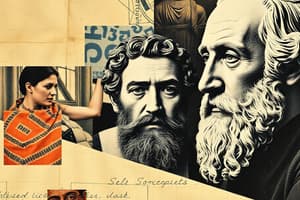Podcast
Questions and Answers
What is the core of the existence of an individual?
What is the core of the existence of an individual?
self
Who stated that 'An unexamined life is not worth living'?
Who stated that 'An unexamined life is not worth living'?
- Socrates (correct)
- Plato
- David Hume
- Aristotle
According to Aristotle, what are the three classifications of the soul?
According to Aristotle, what are the three classifications of the soul?
vegetative, sentient, rational
St. Augustine believed that knowledge of God leads to a better understanding of oneself.
St. Augustine believed that knowledge of God leads to a better understanding of oneself.
What did John Locke emphasize in his philosophical viewpoint?
What did John Locke emphasize in his philosophical viewpoint?
Immanuel Kant believed that the self can only be established through what process?
Immanuel Kant believed that the self can only be established through what process?
What are the three layers into which Freud divided the self?
What are the three layers into which Freud divided the self?
What concept did Gilbert Ryle associate with the nature of the self?
What concept did Gilbert Ryle associate with the nature of the self?
Charles Horton Cooley proposed the idea that the self is developed through social interactions.
Charles Horton Cooley proposed the idea that the self is developed through social interactions.
What are the three principal elements of the self according to Cooley?
What are the three principal elements of the self according to Cooley?
What does anthropology study?
What does anthropology study?
What are the four subfields of anthropology?
What are the four subfields of anthropology?
What is one key aspect that anthropologists associate with the idea of selfhood?
What is one key aspect that anthropologists associate with the idea of selfhood?
Flashcards are hidden until you start studying
Study Notes
What is Self?
- Self represents the core essence of an individual's existence.
The Nature of Self
- Understanding the Self encompasses various perspectives and disciplines, each contributing unique insights into its fundamentals.
The Goal of Understanding the Self
- Grasping the nature of the self can lead to personal growth and improved interpersonal relationships.
The Self from Various Perspectives
- Multiple disciplines, including philosophy, sociology, and anthropology, offer diverse interpretations of self.
Unpacking the Self
- The concept of self includes personal identity, consciousness, and the influence of societal factors.
Taking Care of the Self
- Self-care is essential for mental and emotional well-being and involves intentional actions to maintain a healthy self-image.
Philosophical Perspective of the Self
- Philosophy, defined as "the love of wisdom," explores the fundamental nature of self.
Socrates
- Advocated for self-examination through the Socratic Method, emphasizing that "an unexamined life is not worth living."
Plato
- Introduced the tripartite soul concept:
- Appetitive (desires)
- Spirited (emotions)
- Rational (intellect)
Aristotle
- Defined the soul as the essence of being, categorizing it into:
- Vegetative: Growth functions
- Sentient: Emotional experiences
- Rational: Intellectual capabilities
St. Augustine
- Proposed that moral understanding is subjective, concluding with "I doubt, therefore, I am."
- Emphasized the connection between self-awareness and knowledge of God.
Rene Descartes
- Emphasized doubt and inquiry as fundamental to understanding self; famously stated "Cogito, ergo sum" (I think, therefore I am).
John Locke
- Highlighted the role of experience in forming the self, underscoring self-awareness and reflective thinking.
David Hume
- Positioned impressions (sensations) at the core of self, asserting that feelings shape the understanding of individual identity.
Immanuel Kant
- Suggested that self-identity emerges through the organization of experiences and concepts, linking self to consciousness.
Sigmund Freud
- Divided self into three layers:
- Conscious: Current thoughts
- Preconscious: Accessible memories
- Unconscious: Repressed experiences
Gilbert Ryle
- Viewed the self as a bundle of emotional responses, likening it to a machine governed by feelings.
Paul Churchland
- Developed Neurophilosophy, asserting that understanding behavior requires knowledge of neurological brain functions.
Maurice Merleau-Ponty
- In "Phenomenology of Perception," suggested that consciousness shapes self-awareness through personal and environmental experiences.
Sociology
- Addresses the self through social relationships and group dynamics.
Social Groups and Networks
- The self is influenced by communal interactions and societal structures.
George Herbert Mead
- Proposed that the self is fundamentally social, shaped through communication and social experiences.
Social Self
- Developed through reflecting on others’ perspectives and involves roles adopted in varied social contexts.
Three Key Points from Mead
- The self embodies human reflective capacity and the ability to take on the roles of others at different levels of complexity.
Stages in Mead's Theory on the Development of the Self
- Language: Learning to communicate
- Play: Role-taking in simple contexts
- Games: Complex role-taking involving organized play
Two Sides of the Self
- "I": The spontaneous aspect, representing individual actions.
- "Me": The social aspect, shaped by societal expectations and perceptions.
Charles Horton Cooley
- Developed the concept of the "looking-glass self," emphasizing self-image formation through social interactions.
Anthropological Perspective
- Anthropology studies human behavior and cultures to understand the self.
What Do Anthropologists Do?
- Investigate human diversity, historical context, and the development of cultural identity.
Four Subfields of Anthropology
- Archaeology: Study of past human societies through material remains.
- Biological Anthropology: Focus on human biological variation and evolution.
- Linguistic Anthropology: Examination of language's role in social life.
- Cultural Anthropology: Analysis of cultural practices and beliefs.
Culture
- Culture shapes identities, behaviors, and worldviews, influencing how individuals perceive themselves.
Culture Shapes
- Forms values, establishes norms, dictates social roles, and influences self-perception.
Identity in Anthropology
- Identity, or selfhood, is a central theme in anthropology, reflecting the dynamic interaction between individual experiences and cultural contexts.
Studying That Suits You
Use AI to generate personalized quizzes and flashcards to suit your learning preferences.




